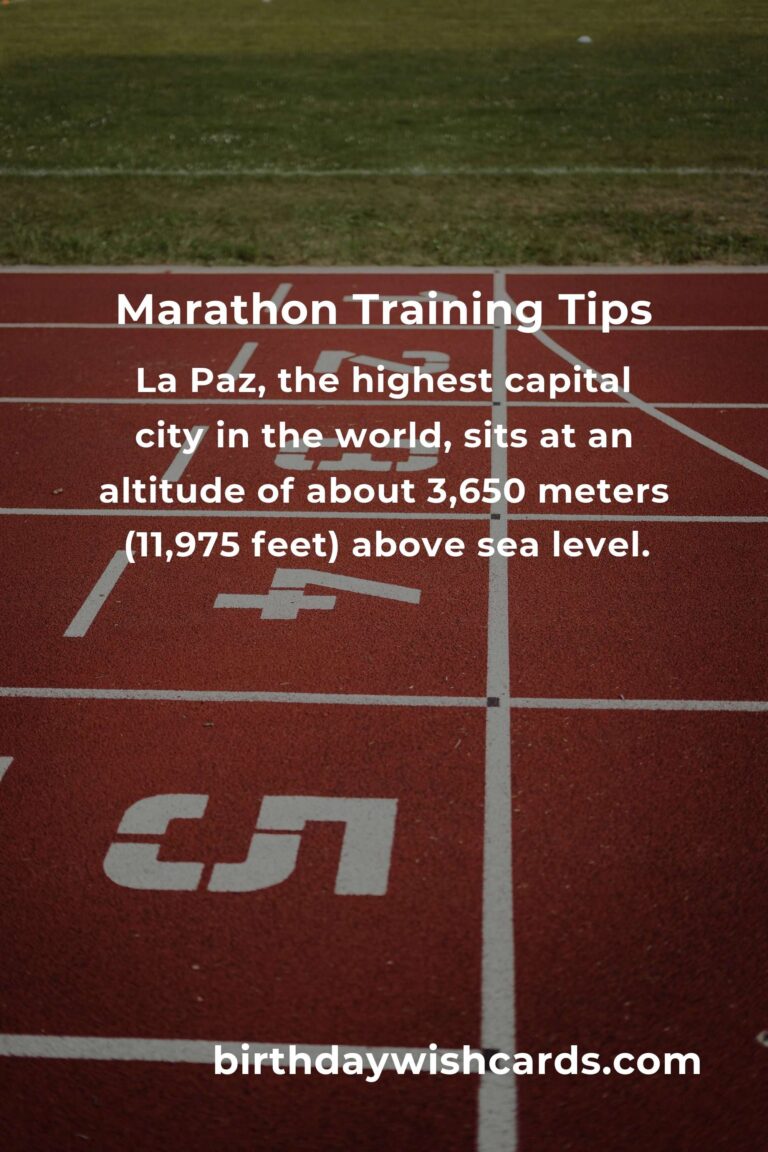
Running a marathon in La Paz can be a thrilling yet challenging experience, especially for beginners. With its high altitude and unique terrain, training for a marathon in this Bolivian city requires careful planning and preparation.
Understanding the Challenges of La Paz
La Paz, the highest capital city in the world, sits at an altitude of about 3,650 meters (11,975 feet) above sea level. This high altitude can affect your breathing and stamina, making marathon training more demanding.
Before starting your training, it’s important to understand how the altitude will impact your body. The air is thinner at high altitudes, meaning there is less oxygen available. This can lead to quicker fatigue, dehydration, and altitude sickness if you’re not accustomed to such conditions.
Setting Realistic Goals
As a beginner, setting realistic goals is crucial. Start by defining what you want to achieve. Are you aiming to complete the marathon, or do you have a specific time goal in mind? Once you have your goals, you can tailor your training plan accordingly.
It’s advisable to start with a shorter race, such as a 5K or 10K, before attempting a marathon. This will help you gauge your current fitness level and identify areas that need improvement.
Developing a Training Plan
A solid training plan is the foundation of marathon success. Your plan should incorporate various elements, including long runs, speed work, hill training, and rest days.
Long Runs: These should be done once a week and gradually increase in distance. The goal is to build endurance.
Speed Work: Incorporate intervals and tempo runs to improve your pace and cardiovascular fitness.
Hill Training: Given La Paz’s hilly terrain, incorporating hill workouts into your plan will strengthen your legs and improve your ability to tackle inclines.
Rest Days: Don’t underestimate the importance of rest. Your body needs time to recover and adapt to the physical demands of training.
Nutrition and Hydration
Proper nutrition and hydration are vital components of any marathon training program. At high altitudes, your body requires more energy, so a balanced diet rich in carbohydrates, proteins, and fats is essential.
Carbohydrates: These are your primary source of energy. Incorporate whole grains, fruits, and vegetables into your diet.
Proteins: Protein is crucial for muscle repair and growth. Include lean meats, beans, and nuts in your meals.
Hydration: Staying hydrated is even more important at high altitudes. Drink plenty of water throughout the day and consider using sports drinks during long runs to replenish electrolytes.
Acclimatization
Acclimatization is the process of allowing your body to adjust to the high altitude. If you’re not a resident of La Paz, it’s important to spend time acclimating before undertaking intense training. This might mean arriving in the city at least a week or two before beginning your marathon training.
During this period, engage in light activities such as walking or jogging to help your body adapt without overexerting yourself.
Listening to Your Body
Pay attention to how your body responds to training. It’s normal to feel tired, but persistent pain or symptoms of altitude sickness should not be ignored. Common symptoms include headaches, dizziness, nausea, and shortness of breath.
If you experience any of these symptoms, it’s crucial to rest and consult a healthcare professional if needed.
Conclusion
Training for a marathon in La Paz is an incredible journey that requires determination, preparation, and patience. By understanding the challenges of high-altitude training and developing a comprehensive plan, you can successfully complete your marathon and enjoy the breathtaking scenery of this unique city.
Running a marathon in La Paz can be a thrilling yet challenging experience, especially for beginners.
La Paz, the highest capital city in the world, sits at an altitude of about 3,650 meters (11,975 feet) above sea level.
Setting realistic goals is crucial for beginners.
A solid training plan is the foundation of marathon success.
Proper nutrition and hydration are vital components of any marathon training program.
Acclimatization is the process of allowing your body to adjust to the high altitude.
Pay attention to how your body responds to training.
#MarathonTraining #LaPazMarathon #RunningTips #HighAltitudeRunning #BeginnerRunner













